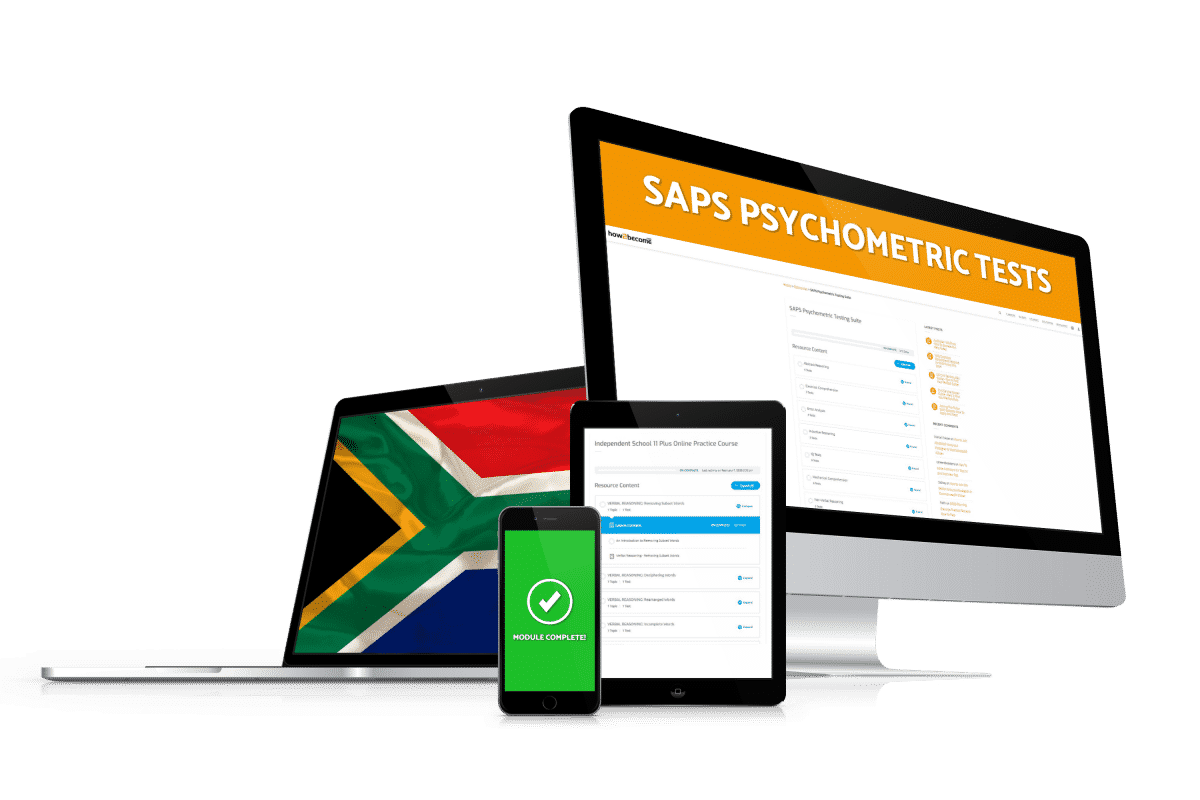The South African Police Service, or SAPS as it is better known, is the national police force of South Africa. With a total of 1,138 police stations divided amongst the nine provinces of South Africa, it’s fair to say that there are a wide number of locations you can apply to. But, with so much variety comes enormous popularity. The competition to join SAPS is fiercer than ever before, and this means that candidates will need to be at the top of their game. In this blog, we’ll guide you through the South African Police selection process, and highlight the types of tests you’ll be likely to face.
SAPS Careers
Generally, if you join the South African Police Service, you’ll either join as a police official, or as a civilian employee:
- Police officials are employed under the terms of the South African Police Service Act. If you’re applying to work as a police official, then your work will be largely focused around the prevention and combating of crime. Police officials are mostly front line – they are out there on the streets fighting criminals and investigating incidents.
- Civilian employees are employed under the terms of the Public Service Act. If you’re applying to work in this capacity, then you will be working in a supporting function ‘behind the scenes’ so to speak, rather than performing frontline police work. Civilian employees’ work focuses around tasks such as administration, clerical responsibility, procurement, and even keeping things clean and tidy at police HQ.
What the above all means, is that if you are someone who wants to work for the South African Police Service, but don’t like the idea of performing front line police work, then there is still a role for you.
South African Police Vacancies
Generally, SAPS advertises for vacancies in both national and local papers. This includes but is not limited to: The Sunday Times, City Press, and Rapport. Individual stations do not have their own websites, and therefore in order to apply you will need to keep a keen eye out for vacancies being advertised. Likewise, you can also check the South African Police careers page – which advertises some roles for both police officials and civilian employees.
One of the best ways to discover vacancies near you, is to visit or get in touch with your local police station (using a non-emergency number), to enquire about the possibility of working for them. Even if there are no vacancies at the present time, it might be the case that you can work for them in a voluntary capacity – which will only strengthen your future application.

Eligibility
In order to join SAPS as a police official, under the terms of the South African Police Service Act, you will need to meet the following eligibility criteria:
- You must be at least 18 years of age, but under the age of 30.
- You must have permanent residency in South Africa.
- You must be able to pass the psychological assessment administered by SAPS, which determines that you fit the profile of a police official.
- You must have a National Senior Certificate (NSC) at Grade 12, or an equivalent.
- You must be fluent in English, and at least one other language.
- You must not have any visible tattoos.
- You must not have any past criminal convictions or history.
For the majority of these rules, you will need to supply SAPS with documented proof that you meet the criteria.
The Selection Process
So, now let’s look at what the selection process actually involves, and the stages required. As you can imagine, obtaining a role with SAPS is no easy task, and you will face a stringent set of selection tests.
Stage 1: Application Form
The type of application form you’ll fill in will very much depend on the role you’re applying for. For example, applicants for civilian employee roles will face a slightly different type of form to applicants applying for police official roles. However, the broad strokes of the application are the same:
- The application form will assess you based on the eligibility criteria and ensuring that you meet the standards and pre-joining requirements of SAPS. This will include questions related to your professional background, your financial history, and your employment history.
- The application form is incredibly comprehensive. We advise taking two or three evenings to complete the entire form, making sure that you have met every single one of the instructions on the form to the letter. Failure to complete the form correctly is likely to lead to rejection – as vacancies for a role within SAPS are extremely popular, and therefore you are unlikely to make it to the next stage if you cannot follow simple instructions.
- The South African Police Service will only accept an official application form, which is available via the SAPS website, or can be collected at SAPS recruitment offices. SAPS are no longer accepting the Z83 form.
- It is imperative that you are honest during your application form. As part of the selection process, SAPS will conduct sustained investigation into your background. If at any point they discover you have not been truthful with the information provided, you will be disqualified from the selection process.
Stage 2: Assessment Centre
If you successfully pass the application form stage, then the next stage is to attend an assessment centre. The SAPS assessment centre will put you through a series of gruelling and rigorous tests, all of which are designed to test whether you have the aptitude, critical thinking skills and competency to work within the South African Police Service. All of the tests will be taken under strict time conditions, and you will be judged on your efficiency as well as your accuracy.
During your assessment centre, you are likely to face tests including:
Numerical Reasoning. Numerical reasoning assesses your ability to work with numbers, and involves calculations such as addition, subtraction, percentages, fractions, ratios, data and statistics, graphs, charts and other such numerical necessities.
Verbal Reasoning. Verbal reasoning is a key part of the assessment centre, and covers two areas (the second of which we will discuss in the next bullet). Verbal reasoning tests your understanding of words, phrases, grammar, spelling and punctuation.
Comprehension. The comprehension exercise will require you to read a passage of text, and then answer questions based on said text. Your speed-reading skills will be very important here, as you are under strict timed conditions, and must be able to demonstrate that you can quickly and efficiently absorb information from a written passage.
Psychometric Assessment. The final testing stage of the assessment centre will be a series of psychometric tests, including spatial reasoning and non-verbal reasoning. You might also be asked to take a concentration test. This is perhaps the hardest part of the assessment centre – as these tests will involve looking at shapes, identifying patterns, differences between different shapes, and completing shape-based sequences, all at rapid speed!
For a limited time only:
Get 14-days free access to SAPS psychometric testing suite. Packed full of SAPS psychometric test questions, answers and explanations.
- 100s of SAPS psychometric evaluation test questions;
- Detailed answers and explanations to all of the questions;
- Tips to pass psychometric assessments;
- Get instant access via your How2Become account.
Stage 3: The Interview
Whether you will need to sit an interview at the assessment centre, or following the assessment centre, depends on the role you’re applying for. However, you can expect the interview to be conducted under formal conditions, and you will be rigorously tested by the individuals conducting said interview. The questions are likely to focus around:
- Your ability to work under pressure.
- Your ability to work as a member of a team.
- The reasons why you’re applying to join SAPS.
- What you already know and have learned about SAPS.
- Why you think you would make a good police officer.
- Your expectations for the role.
- Your plans for the future.
If you are invited to attend the interview, or even if this just takes place at the assessment centre, make sure you wear a suit! Dressing smart shows professionalism and respect, and will make a real difference to your chances of success.

Stage 4: Fitness and Medical Checks
Once you’ve passed the first three stages, you’ll be asked to take a series of fitness and medical tests, to ensure you meet the physical criteria required. The fitness tests are as follows.
Male candidates must complete the following challenges:
- First, you’ll need to run 2.4 kilometres in 13 minutes or less.
- Second, you’ll need to complete 30 push-ups in 1 minute or less.
- Thirdly, you’ll need to perform 45 sit-ups in 1 minute or less.
- Finally, you’ll need to complete 10 shuttle runs in 1 minute or less.
Female candidates must complete the following challenges:
- First, you’ll need to run 2.4 kilometres in 15 minutes and 30 seconds.
- Second, you’ll need to complete 21 push-ups in 1 minute or less.
- Thirdly, you’ll need to perform 31 sit-ups in 1 minute or less.
- Finally, you’ll need to complete 10 shuttle runs in 70 seconds or less.
Following completion of the fitness and medical tests, you will be entered into the South African Police training programme.
South African Police Training
The training period for SAPS is rigorous and tough, and this means that not every single person passes. Below we’ve outlined some key things to note about the training:
- The initial training period lasts for approximately 6 months. You’ll conduct 3 months of theoretical study, and 3 months of practical study, all of which will be conducted at one of six colleges set up for South African Police training.
- Following the 12-month training period, you will enter the South African Police as a student constable. This title essentially means that although you have completed your initial training, you are still learning, and therefore will be required to gain more experience. Usually, your time as a student constable will be spent working in a community-based capacity, gaining experience in dealing with the public and learning vital tips which will take you forward in your SAPS career. This period lasts for approximately 6 months.
- Once your time spent working as a student constable has been completed, you will spend another 12 months training as a member of SAPS – dealing with everyday police scenarios and essentially functioning as a fully qualified member of the police force. Following this 12-month period, you will be inducted as an official employee of SAPS.




I really want to work at SASP
Hi there,
It’s great to hear you wants to join the South African Police. Let us know any questions you have, and we’ll do our best to assist.
Sincerely,
The How2Become Team
Where to get Application form?
Hi Valisa, you will need to contact your local police station to obtain an application form
i am living in the eastern cape and want to begin a career in policing, please advise on steps i need to take for the application process, i have scoured the internet looking for information and have found little to none on obtaining aplications ext. thank you i look forward to your response.
Hi Ianga, the selection process is outlined in this blog. If there’s anything we’ve not covered that you’d like further advise on please let me know.
I like to be a police officer
How can I get application form online
Hi my name is Marco Goncalves .I’m 13 YEARS old and I will like to become a part of the SAPS like my father
I like to be a police officer oneday to protect those who need help couse MyLife I come out poor background family I know .
Hi…I did all 3 assessments and went for interview on the 4th of March but I haven’t receive any feedback till today
I won’t rest until I become a police officer
I wanna be a police officer since I started school
I did all 3 assessment but i didnt get feed back why ?
Hi Phumeza, you will need to contact your local station for help with this.
I really want to want at saps I promise that if I get this job i will make a difference
M willing 2b a police officer 2 serve ma country
It was and still a dream to work for the police ,I’m turning 29 and covide 19 is really not really helping ,I cant takenit that I see so much needed and i cant do anything presently this means the world to me ,i was born for this
I really want to be police officer or detective. I will be able to stop corruption and crime in south africa. I do love to. Please consider me.
Hi
i just want to know can you by any chance apply if you older than 30 years of age?
I used to work as a police officer in egypt since 2005 after 5 years police academy till I did graduate .. I retired and I started a new Buisness and I would like to move with my family to Cape Town and was wondering if it will be possible to apply as a police officer in Cape Town I have 13 years experience in police work and speaking English and French and Arabic as mother tongue
I want to apply for SAPS because i want to help communities that need help and stop crime in our areas
I would really love to work for SAPS in IT. How can I apply?
How do i apply to be police officer ?
Hi Tshego, if you cannot find an answer to your question in the blog please let us know how we can help further 🙂
I love SAPS and I chose it as my career at school,well most people say you won’t get rich when you’re in the SAPS environment but honestly it is not about money it’s about helping and keeping people of our communities safe.
Well I am fresh from school and I’d love to know that what do you do when you want to join SAPS?
I will do anything to save the nation.
I really want to become a police officer i cant wait for application forms to be out i have drivers licence security Grd C and competency
I really I wanna be a SAPS I have a vision to change my counrty .how can I apply
Is it really necessary to have a firearm competency?
Please advise if a GED, which is an equivalent to NQF4, and accepted by SAQA, will be acceptable to enrol into the police academy?
I’m a 17 year old Man and I would really like to be a police officer preventing crime around my community and in the whole city I live at. I managed to complete my matric while achieving a diploma and I have no work experience but I am sure ready to experience work.
Good day ,
I wrote a Psychometric and Integrity test on 14 Jan 2019 and was told that we will be notified within 3 months if one has passed or failed the test, unfortunately Covid-19 took us by storm by then therefore my greatest concern is to know if we will ever be replied via sms as promised regarding our test results ,and go through to the next step with the assessments once the Covid-19 has blown over or decreased in some sort. And where do I do follow ups regarding my test results?
Hi Melinda, you will need to follow this up with the station you have applied to.
Apologies for my mistake the test was written on 14 Jan 2020 not 2019.
Hi Melinda hope you well,me and you have the same problem i tried to call head office but they not answering the call. I will keep trying on my side and if i get anything i will update you.
If I’m 30 years and 16 days old may i Appy to be a police officer?
Hi Sinelizwi, to be eligbile you must be at least 18 years of age, but under the age of 30.
I have registered to study for a diploma in policing which will take me three years to finish. I’m now 32 years and will only finish when I’m 35. So this means there is no chance for me working for SAPS after obtaining my qualification because of age?
Hi Thabisa, you should confirm this SAPS as they will be able to advise you better.
What I know if you have a qualification, there is no age restriction, the age restriction applies only for the frontliners
Clear-cut article and most information are there.
There’s no way some of these officers doing their rounds passed that fitness test. absolutely no way.
Can someone lose a job at pre employment for failing medical tests from SAPS
Hi there! Thank you for your comment. It is not uncommon for candidates to be concerned they won’t “get through” the pre-employment medical examination because of a previous injury, or because of a medical problem. Employers cannot, and do not, exclude people because of this.
Hi , I’m Fortunate .
I once applied for volunteering at the police and I got a call to go and write the psychometric test and I did ,by that time in January the posts for police training were not out .. so later in February they got out , should I apply for police training since it has been my dream??
Hi Fortunate! If this has been your dream then you should follow that path 🙂
I would like to apply this year 2022, and also willing to continue studying once iget the chance, since i have genetics qualification can that help me to become a forensic analyst?